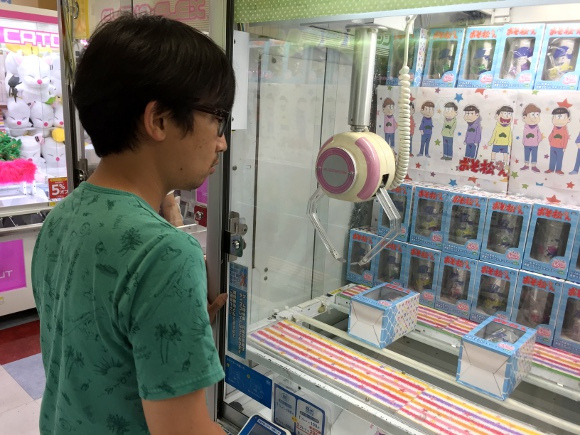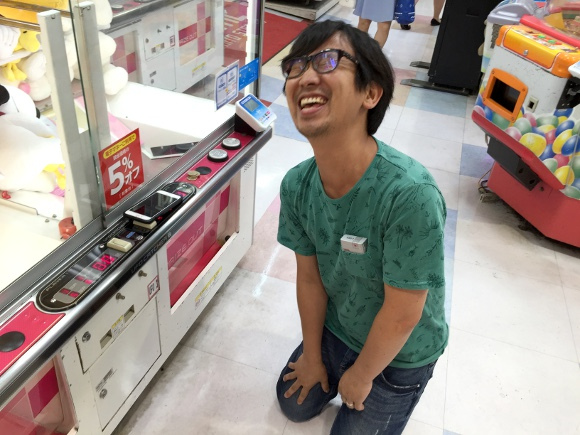
Japan’s first-ever crane game fraud investigation claims arcades used secret setting so prizes could only be won in employee demonstrations.
As anyone who’s ever blown through a thousand yen trying to win a stuffed animal or extra-large box of Pocky at a Japanese arcade can tell you, crane games are hard. Making things even more frustrating is that they should be so easy, since all you have to do is position the crane in the right spot and hit the button. So why are they so difficult? It’s almost like they’re rigged!
And according to the police, they actually were at one arcade chain.
On December 23, officers from the Osaka Police Department arrested Takeshi Ohira, the 33-year-old owner of the ironically named Amusement Trust chain of arcades, which has locations in Osaka and Kyoto. Also arrested were five Trust employees, men and women ranging in age from 25 to 36.
The suspects stand accused of altering the settings on their crane games to make it impossible for the player to win. Various models of machines were involved in the alleged scam, including one where the player has to manipulate a pair of scissors to cut a string holding up the prize, as shown in the video below from ANN News.
The authorities claim that as players continued to lose, Trust employees would stand next to them, encouraging them to keep playing with comments like “It’d be a waste if you quit now,” correctly assuming that when out having fun at an arcade, many people aren’t thinking about sunk cost fallacies. Even worse, when players started to get really discouraged, Trust employees would helpfully offer to demonstrate effective techniques, switching places at the machine with the customer for one play. When employees opened up the locked internal control panel to give themselves a free credit in order to demonstrate, they’d also change the setting to that they could win, and after showing how easily prizes could be won, they’d switch the machine back to being unwinnable before letting the customer try (and pay) again.
While most crane games in Japan cost 100-200 yen per play, the machines involved in Trust’s alleged scam were priced at between 500 and 10,000 yen (US$4.50-US$89.30) per try, and offered high-end prizes such as self-balancing scooters/hoverboards and video game consoles, as well as less pricey items such as anime figures and stuffed animals.
While police only made their moves last week, local rumors that Trust’s crane games were rigged had been circulating for some time, and the authorities were finally prompted to make a move after receiving an increasingly steady stream of complaints from suspicious customers. Claims of fraud go back all the way to 2015, however, with investigators estimating the scam bilked players out of some six million yen (US$53,600).
Ohira has denied ever instructing his workers to make the machines unwinnable, but the five arrested employees have all admitted to such wrongdoing. One of them, the manager of Trust’s Osaka Dotombori branch, says that one customer dropped 300,000 yen on a rigged machine.
The investigation is the first of its kind targeting crane game fraud in Japan, and is likely to prompt greater scrutiny of arcade operators in other jurisdictions as well. Hopefully this incident will serve as a lesson to arcades to stick to legal ways of boosting crane game revenue (like putting bikini models inside the machine), and also to remind customers that crane games are never a sure thing.
Source: Yahoo! News Japan/Mainichi Shimbun
Images ©SoraNews24
Follow Casey on Twitter, where he’s proud of himself for winning that Zaku mecha keychain from a Shinjuku crane game on his very first try.


 Sega of America taken to court in five million dollar lawsuit, accused of deceiving users
Sega of America taken to court in five million dollar lawsuit, accused of deceiving users World record set for most crane games in one arcade with new game center in Tokyo
World record set for most crane games in one arcade with new game center in Tokyo Can monkeys win at Japanese crane games? Experiment attempts to find out【Video】
Can monkeys win at Japanese crane games? Experiment attempts to find out【Video】 How many prizes can you win from Japanese arcade crane games with 10,000 yen?【Experiment】
How many prizes can you win from Japanese arcade crane games with 10,000 yen?【Experiment】 Man loses 200 times at crane game, calls police to investigate, staff member loses 300 times too
Man loses 200 times at crane game, calls police to investigate, staff member loses 300 times too McDonald’s new Happy Meals offer up cute and practical Sanrio lifestyle goods
McDonald’s new Happy Meals offer up cute and practical Sanrio lifestyle goods All-you-can-drink Starbucks and amazing views part of Tokyo’s new 170 meter-high sky lounge
All-you-can-drink Starbucks and amazing views part of Tokyo’s new 170 meter-high sky lounge Studio Ghibli glasses cases let anime characters keep an eye on your spectacles
Studio Ghibli glasses cases let anime characters keep an eye on your spectacles Kyoto’s 100 Demons yokai monster parade returns!
Kyoto’s 100 Demons yokai monster parade returns! Beautiful Sailor Moon manhole cover coasters being given out for free by Tokyo tourist center
Beautiful Sailor Moon manhole cover coasters being given out for free by Tokyo tourist center More foreign tourists than ever before in history visited Japan last month
More foreign tourists than ever before in history visited Japan last month Starbucks reopens at Shibuya Scramble Crossing with new look and design concept
Starbucks reopens at Shibuya Scramble Crossing with new look and design concept The oldest tunnel in Japan is believed to be haunted, and strange things happen when we go there
The oldest tunnel in Japan is believed to be haunted, and strange things happen when we go there Is the new Shinkansen Train Desk ticket worth it?
Is the new Shinkansen Train Desk ticket worth it? Super Nintendo World expansion gets delayed for several months at Universal Studios Japan
Super Nintendo World expansion gets delayed for several months at Universal Studios Japan Disney princesses get official manga makeovers for Manga Princess Cafe opening in Tokyo
Disney princesses get official manga makeovers for Manga Princess Cafe opening in Tokyo Beautiful new Final Fantasy T-shirt collection on the way from Uniqlo【Photos】
Beautiful new Final Fantasy T-shirt collection on the way from Uniqlo【Photos】 Foreign English teachers in Japan pick their favorite Japanese-language phrases【Survey】
Foreign English teachers in Japan pick their favorite Japanese-language phrases【Survey】 Japanese convenience store packs a whole bento into an onigiri rice ball
Japanese convenience store packs a whole bento into an onigiri rice ball We try out “Chan Ramen”, an underground type of ramen popular in the ramen community
We try out “Chan Ramen”, an underground type of ramen popular in the ramen community Studio Ghibli releases Kiki’s Delivery Service chocolate cake pouches in Japan
Studio Ghibli releases Kiki’s Delivery Service chocolate cake pouches in Japan Japan’s bone-breaking and record-breaking roller coaster is permanently shutting down
Japan’s bone-breaking and record-breaking roller coaster is permanently shutting down New definition of “Japanese whiskey” goes into effect to prevent fakes from fooling overseas buyers
New definition of “Japanese whiskey” goes into effect to prevent fakes from fooling overseas buyers Our Japanese reporter visits Costco in the U.S., finds super American and very Japanese things
Our Japanese reporter visits Costco in the U.S., finds super American and very Japanese things Studio Ghibli unveils Mother’s Day gift set that captures the love in My Neighbour Totoro
Studio Ghibli unveils Mother’s Day gift set that captures the love in My Neighbour Totoro Foreign passenger shoves conductor on one of the last full runs for Japan’s Thunderbird train
Foreign passenger shoves conductor on one of the last full runs for Japan’s Thunderbird train Domino’s Japan now sells…pizza ears?
Domino’s Japan now sells…pizza ears? New Japanese KitKat flavour stars Sanrio characters, including Hello Kitty
New Japanese KitKat flavour stars Sanrio characters, including Hello Kitty Kyoto creates new for-tourist buses to address overtourism with higher prices, faster rides
Kyoto creates new for-tourist buses to address overtourism with higher prices, faster rides Sales of Japan’s most convenient train ticket/shopping payment cards suspended indefinitely
Sales of Japan’s most convenient train ticket/shopping payment cards suspended indefinitely Sold-out Studio Ghibli desktop humidifiers are back so Totoro can help you through the dry season
Sold-out Studio Ghibli desktop humidifiers are back so Totoro can help you through the dry season Japanese government to make first change to romanization spelling rules since the 1950s
Japanese government to make first change to romanization spelling rules since the 1950s Ghibli founders Toshio Suzuki and Hayao Miyazaki contribute to Japanese whisky Totoro label design
Ghibli founders Toshio Suzuki and Hayao Miyazaki contribute to Japanese whisky Totoro label design Doraemon found buried at sea as scene from 1993 anime becomes real life【Photos】
Doraemon found buried at sea as scene from 1993 anime becomes real life【Photos】 Tokyo’s most famous Starbucks is closed
Tokyo’s most famous Starbucks is closed One Piece characters’ nationalities revealed, but fans have mixed opinions
One Piece characters’ nationalities revealed, but fans have mixed opinions We asked a Uniqlo employee what four things we should buy and their suggestions didn’t disappoint
We asked a Uniqlo employee what four things we should buy and their suggestions didn’t disappoint Princesses, fruits, and blacksmiths: Study reveals the 30 most unusual family names in Japan
Princesses, fruits, and blacksmiths: Study reveals the 30 most unusual family names in Japan Tokyo’s newest crane game prize is prized pears from west Japan, and you’re guaranteed to win
Tokyo’s newest crane game prize is prized pears from west Japan, and you’re guaranteed to win Hilarious terror ensues as contest with Japanese arcade UFO catcher ends in a tie 【Video】
Hilarious terror ensues as contest with Japanese arcade UFO catcher ends in a tie 【Video】 Win real, natural gemstones at Saitama game center, which boasts over 300 crane games!【Video】
Win real, natural gemstones at Saitama game center, which boasts over 300 crane games!【Video】 Akihabara arcades aren’t dead yet! New six-floor game center opens in Tokyo otaku quarter next month
Akihabara arcades aren’t dead yet! New six-floor game center opens in Tokyo otaku quarter next month Want some canned Japanese idol air? Smartphone virtual crane game offering exactly that as prize
Want some canned Japanese idol air? Smartphone virtual crane game offering exactly that as prize We beat two crane games at a Japanese arcade and take home two lucky bags
We beat two crane games at a Japanese arcade and take home two lucky bags Bandai to launch online capsule machines controlled by smartphone
Bandai to launch online capsule machines controlled by smartphone Real gems from Japanese arcade UFO catchers: Crane-caught riches, or a shiny scam?
Real gems from Japanese arcade UFO catchers: Crane-caught riches, or a shiny scam? Tokyo losing another iconic video game arcade as Ikebukuro landmark is closing for good
Tokyo losing another iconic video game arcade as Ikebukuro landmark is closing for good Hi-Chew releases new Japanese School Lunch flavor to stimulate appetites and nostalgia
Hi-Chew releases new Japanese School Lunch flavor to stimulate appetites and nostalgia Sega’s been hiding a snarky message on its arcade bags for two years but no one noticed until now
Sega’s been hiding a snarky message on its arcade bags for two years but no one noticed until now Taiwanese crane games with bikini women inside spark controversy【Video】
Taiwanese crane games with bikini women inside spark controversy【Video】 Korean authorities seize 530,000 fake Pokémon plushies, show off portion in video【Video】
Korean authorities seize 530,000 fake Pokémon plushies, show off portion in video【Video】 Low-quality paper cranes folded by young gyaru – Japan’s newest weird capsule toys
Low-quality paper cranes folded by young gyaru – Japan’s newest weird capsule toys Tokyo’s most famous arcade announces price increase, fans don’t seem to mind at all
Tokyo’s most famous arcade announces price increase, fans don’t seem to mind at all Four foreign men arrested near Tokyo under charges of “international romance fraud”
Four foreign men arrested near Tokyo under charges of “international romance fraud”
Leave a Reply